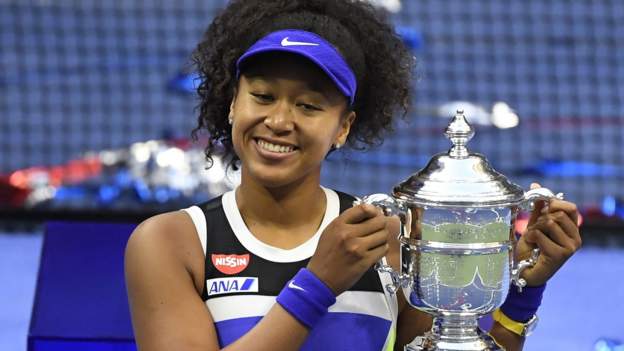
US Open champion Naomi Osaka says the time she was forced to take off tennis because of the coronavirus pandemic helped her win a third Grand Slam.
Osaka, 22, fought back from a set down to beat Victoria Azarenka in Saturday's final at Flushing Meadows in New York.
"The quarantine definitely gave me a chance to think a lot about things, what I want to accomplish, what I want people to remember me by," said Osaka.
"I would definitely say it's been an important few months."
Victory earned her a third major title after winning the 2018 US Open and 2019 Australian Open.
Osaka has demonstrated a growing maturity during the US Open bubble, which included last month's Western and Southern Open being held at Flushing Meadows before the Grand Slam event.
On the court, her improved mental resilience has helped her forge an 11-match winning streak since the professional tours returned last month.
The Japanese fourth seed needed that against Azarenka after being overwhelmed in a one-sided first set, and being a point away from trailing 3-0 in the second set, before recovering to win 1-6 6-3 6-3.
Off the court, she has used her platform to speak out about racism and police brutality in the United States.
"For me, my life was always go, go tennis-wise, especially after the previous US Open that I won," she said when asked about the impact of the disrupted season.
"It definitely accelerated things, and I've never had a chance to slow down.
"I feel like I've definitely tried to mature. I wasn't really sure the process that I was going to have to take.
"But I feel like the lessons that I learned with life definitely developed me as a person more."
Although Osaka's second US Open win came in strange circumstances in a near-empty Arthur Ashe Stadium, it provoked wildly different emotions to her first.
Two years ago, she was left in tears as she waited to collect her first Grand Slam trophy following a tumultuous match against Serena Williams.
The American had an infamous argument with umpire Carlos Ramos, which created a hostile environment among an Ashe crowd unhappy at Williams' treatment.
"This win feels different overall because of the circumstances I'm under. I wasn't in a bubble last time. There were a lot of fans last time," she said.
"I feel like in the end all I focus on is what I can control on the tennis court. That's what I did last time. I feel like that's what I did this time."
Whether or not Osaka will try to win back-to-back majors again at the French Open later this month remains to be seen after she was non-committal about her plans.
"I was planning to play when I came here [to the US Open], but I guess I'll see what happens," she said.
Plenty of positives but 'very painful' for Azarenka
Azarenka was aiming to complete a remarkable renaissance by landing her first Grand Slam title since defending her Australian Open crown in 2013.
After a blistering first set where she made just three unforced errors, the 31-year-old continued to play at the same level early in the second before that pivotal third game changed the complexion of the match.
Even though her levels understandably started to dip, the decider was evenly poised until she was broken for 5-3 and Osaka served out victory.
"I'm not necessarily disappointed. It's just painful. It's painful to lose. That is what it is," said Azarenka, who also lost the 2012 and 2013 US Open finals to Serena Williams.
"It was close. I was close. But it didn't go my way."
The former world number one, who gave birth in 2016 and then fought a custody battle over son Leo, says she was close to quitting the sport earlier this year.
With the professional game suspended because of the coronavirus pandemic, she did not pick up a racquet for five months and considered her professional future.
But she did return and has astounded many by following up winning the Western & Southern Open with this run to the US Open final.
"I was really not planning on coming to play until I had my personal issues resolved," said Azarenka, who will rise to 14th in the world rankings.
"So I never really made the final decision because I was going to do that after.
"But what kept me in the game is my desire to go after what I want."















 Phone: (800) 737. 6040
Phone: (800) 737. 6040 Fax: (800) 825 5558
Fax: (800) 825 5558 Website:
Website:  Email:
Email: 






